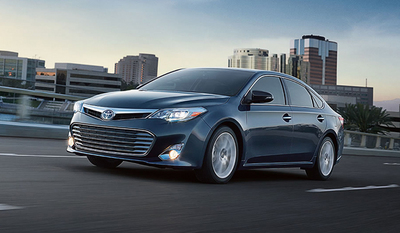2016 Toyota Avalon Hybrid XLE Plus Review By Steve Purdy
SEE ALSO: Expectant Toyota Team Members See New Arrival
2016 TOYOTA AVALON HYBRID XLE PLUS
Review
By Steve Purdy
Senior Editor
The Auto Channel
Michigan Bureau
Last week we reviewed the 2016 Lexus ES350 without any expensive options – just the basic car. It was just under 40 grand. For two grand less we could get this week’s test car, a 2016 Avalon Hybrid. Both are built off the same platform, about the same size and nearly the same level of upscale ambiance but the Avalon Hybrid provides more standard content and much better fuel economy. While I like them both, this Avalon is more car for the money and the approximately 30 to 50% better fuel mileage is a big deal.
The Avalon Hybrid got a new grill and front fascia this year for a bit more panache. You can tell it is the Hybrid by the blue highlights around the Toyota badge in the grille. We found the Avalon conservatively attractive particularly compared to earlier versions that tended to be as undistinguished as anything on the road. This one’s stance and profile are fully modern with just enough shinny bits. While Avalon has always been a competent, durable and practical car it has not had even a hint of panache until this current generation introduced in 2012. And it is a real looker.
Particularly attractive is the up-scale interior of the Avalon. The large center stack (if we can call it that) slants upward reducing glare and making it easier to manage the controls. A handy, covered bin, where 12V outlet, auxiliary outlet and USB reside, is just below and ahead of the shifter. An incongruous brow above the main instruments in front of the driver is the only design element that does not seem to contribute to the visual pleasantry. Lots of stitching and very nice materials make it feel more Lexus-like.
Seating is comfortable front and rear with the rear providing lots of legroom. The stylishly low roofline limits headroom a bit but that will not be noticed by anyone under six feet tall. Eight-way power front seats include a power lumbar support. They’ve done a marvelous job of packaging the batteries mostly behind the rear seat leaving more trunk volume at 14 cubic-feet than the previous model and way more than the earlier Camry Hybrid.
The powertrain of the Avalon Hybrid constitutes much of its claim to fame. I’m not sure what generation this is of Toyota’s ground breaking ‘Synergy Drive’ hybrid system but Toyota has led the league in this technology since the first Prius of the 1990s. In this case a 2.5-liter four-cylinder gasoline engine augmented by an electric motor with power fed through a sophisticated, electronically controlled CVT (continuously variable transmission) is good for about 200 horsepower combined. It certainly feels like more. Our colleagues at Edmunds achieved a 0-60 time of a decent 7.7 seconds. It is truly amazing what an electric motor can do for acceleration particularly from low speed.
The EPA rates the 3,600-pound Avalon Hybrid at 40 mpg in the city, 39 on the highway with a 40 mpg combined using regular fuel. The conventionally powered V6 Avalon is rated at 21 in the city and 31 on the highway. We managed 33.5 mpg in our week of driving that included a trip to Chicago that is 250 miles of freeway each direction. Hybrids, of course, are at their best in urban driving. The 17.5-gallon fuel tanks makes for an excellent range considering the admirable economy of the hybrid system.
On the road the Avalon is a pleasure to live with. Seats are generous and well designed with enough lateral support to keep us in place but not enough to restrict our easy movement like some of the German brands. As we expect it is remarkably quiet even on coarse and chunky pavement. We found the suspension pleasantly firmer than we remembered from earlier Avalon tests. The electronically controlled CVT only felt whiny on full throttle and that happens very little.
The new Avalon Hybrid starts at $36,650. Our test car has no options listed but is mighty well equipped with leather seats and trim, power tilt/slide moonroof, dual-zone climate control, push button start with smart key, Quadrabeam halogen headlights, 17-inch alloy wheels, Entune apps with 7-inch touchscreen and plenty more. We could think of nothing we wished the car had during out testing time with the Avalon.
Toyota’s new car warranty covers the whole car for 3 years or 36,000 miles and the powertrain for 5 years or 60,000 miles and the hybrid components for 8 years or 100,000 miles. It is important to note that over the nearly two decades Toyota has been making hybrids the batteries, motors and control units have proven to be remarkably dependable.
Compare the Avalon Hybrid to other full-size sedans in its price range and you’ll find it remarkably competitive in spite of the more expensive powertrain. Most of its competitors do not offer a hybrid but with a few options end up priced around the same. With fuel prices at a low ebb perhaps the mileage numbers aren’t as important as they were not long ago, but . . . who among you think gas will continue to be so cheap?
© Steve Purdy, Shunpiker Productions, All Rights Reserved
The Most In-Depth Toyota Vehicle Shopper's Research - Anywhere!



